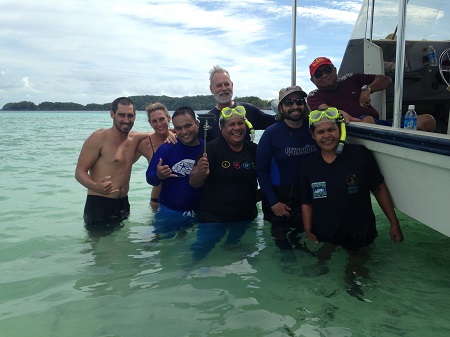
Marine Science instructor Jameson Newtson (far left) joins fellow scientists at a workshop in Palau in June 2014. Next to Jameson is former ASCC Marine Science instructor Lauren Wetzell, who now works for the University of Hawaii. (Courtesy Photo)

Marine Science instructor Jameson Newtson (far left) joins fellow scientists at a workshop in Palau in June 2014. Next to Jameson is former ASCC Marine Science instructor Lauren Wetzell, who now works for the University of Hawaii. (Courtesy Photo)
ASCC Marine Science Instructor Attends Climate Change Workshop
July 26, 2014
By James Kneubuhl, ASCC Press Officer
American Samoa Community College (ASCC) Marine Science instructor Jameson Ka’eo Newtson joined faculty in the same field from the College of the Marshall Islands, College of the Federated States of Micronesia, and Northern Marianas College at the Climate Change Science workshop held in Palau earlier this summer, and hosted by the Palau Community College (PCC) and the Pacific Island Coral Reef Center (PICRC). The workshop focused on content and tools to monitor ocean acidification (OA), a troublesome consequence of climate change, and discussions of the scientific tools to monitor OA with world-renowned coral reef experts Dr. Robert Richmond (University of Hawaii) and Dr. Robert Dunbar (Stanford University).
Since the industrial revolution, both burning of fossil fuels and deforestation have greatly contributed to the unprecedented rate-increase of atmospheric CO2. As CO2 dissolves into the seawater, the ocean’s pH decreases (becoming less alkaline and more acidic). This process is called “ocean acidification” and makes needed ions such as calcium and carbonate less available to those organisms that depend on them to form skeletons such as coral reefs. As a result, these calcium carbonate building organisms will have less energy to grow, feed, and reproduce. OA is changing the marine ecosystems so rapidly that the next generation will not know coral reefs the same way as seen today. Recent scientific research warns that OA, in combination with sea surface warming, will cause mortality in 60% of the world’s coral reefs, which increase the vulnerability of Island Nations to sea level rise and food security.
Faculty members participating in the three-day workshop were provided with a geographically relevant climate change curriculum, five Hobo temperature and light sensors, six calcium carbonate rate units (CAUs - provided by NOAA Coral Reef Ecosystem Division, CRED program), hardware, and software. The participants received training on the use of these tools to determine water quality through measuring pH (acidity and alkalinity) and nutrient runoff (nitrates, nitrites, and phosphates). They will go on to share these tools with their students and collaborate with the PICRC, UH, and Stanford for a first-of-its-kind study on OA, encompassing a geographical region reaching north and south of the equator and west and east of the international dateline.
“Climate change has emerged as a critical issue for the Pacific Islands, with some islands already experiencing measureable impacts tided to elevated sea surface temperatures, sea level rise, and ocean acidification,” reflected Newtson. “The workshop provided training and tools for me and my students to begin monitoring the impacts of climate change here at home. It has also given me the opportunity to meet with climate change experts as well as other community college faculty from around the Pacific to discuss and share climate change curriculum and the challenges we have as educators in the face of climate change.” Incidentally, one of the workshop facilitators was Lauren Wetzell, a former ASCC Marine Science instructor who now serves as Education and Communication Specialist for the University of Hawaii Kewalo Marine Laboratory.
“American Samoa is not exempt from the impacts of climate change,” Newtson explained. “Coral bleaching, ocean acidification, and rising sea levels are occurring locally. It is my obligation to educate students of American Samoa on these issues and how we can adapt to this ever-changing world. This workshop has given me the tools, training, and classroom materials to be successfu at this. Once all the community colleges from the workshop have their tools deployed, the data that we collect can be shared amongst us, and used in the class- room by instructors for lectures, by the students for class projects, and by resource management agencies and researchers interested in monitoring climate change.”
The workshop was part of an eight-year ongoing effort to build Pacific islander capacity in Science, Technology, Engineering, and Mathematics – or STEM fields – funded by the National Science Foundation for the Advancement of Technology Education (NSF-ATE). Thus far, the NSF-ATE for Pacific Islanders program has increased STEM enrollment, achieved high levels of retention and graduation, and promoted student success through entry into STEM related careers and/or pursuit of four-year and post graduate degrees. The key goals in this effort are to: improve the technologies available to the students at the community colleges; train Pacific island students for the key STEM jobs in their regions; and support capacity development at the institutional and community levels. The ultimate goal of the program is to build place-based cohorts skilled to address the environmental challenges faced by their homelands, and reduce the reliance on expatriate and outside expertise.
For more information on the Marine Science program at ASCC, visit the College’s website at www.amsamoa.edu. (Portions of this story were contributed by Lauren Wetzell, UH Kewalo Marine Laboratory).
